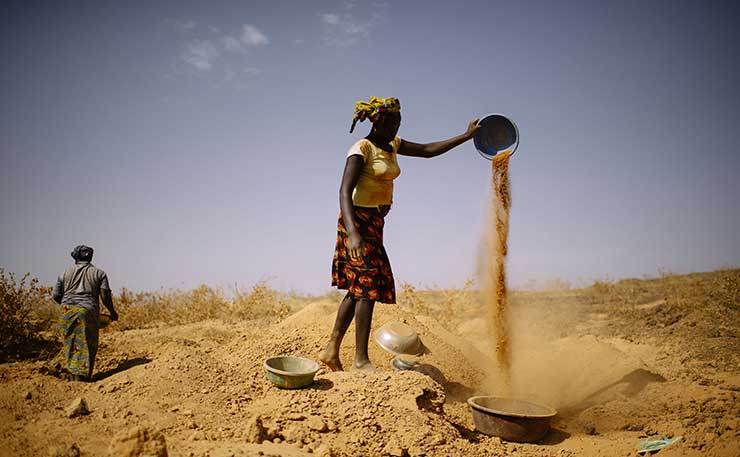Australian mining companies in Perth lined up last week to learn more about exploiting Africa’s mineral wealth. In the second of a three-part series Lucy Manne from ActionAid explains while African women will be the big losers.
Foreign Minister Julie Bishop says she is passionate about gender equality, and has often used her platform to promote women’s rights. In Vogue last year, she wrote that “an important aspect of my responsibilities is ensuring that Australia and our international partners can empower more women,” and that “Australia is recognised as world leader in supporting gender equality and women’s empowerment”.
Yet late last week, she stood in front of a room full of men at the Africa Down Under conference in Perth, and endorsed an industry that has systematically caused violations of women’s rights and fuelled violence, injustice and inequality.
The conference – held at the 5-star Pan Pacific Hotel with an admission price of $1,700 a ticket – promotes the Australian mining industry’s rapid expansion into Africa, where Australian companies are now more numerous than companies from anywhere else in the world.
Presenters at the conference include ministers and senior government officials from across Africa and Australia, plus captains of the Australian mining industry. And with just a handful of exceptions, including our Foreign Minister, they are almost all men – by our count, about 92% to be precise.
Perhaps this gender disparity helps explain why women’s rights has been the elephant in the room at the Africa Down Under conference. The evidence from the UN, civil society organisations, and affected communities points to a serious systemic shortcoming – structural violence against women embedded in the extractives sector across Africa. Women in marginalised mining affected communities are forced to shoulder the direct and indirect costs of the extractive industry, while not profiting at all.
Studies conducted by ActionAid and others have found overwhelming evidence that the mining industry in Africa systematically causes increases in gender-based violence, unpaid labour, food insecurity, water pollution, chronic health problems, and HIV rates for women. Yet the Africa Down Under conference has so far been silent on mining’s impacts on women and their communities.
That’s something that Francina Nkosi, a feminist activist from Lephalale in South Africa, is trying to change. This week she travelled to Perth to represent the women affected by coal mining in her hometown, and to demand that the voices of women from mining affected communities are heard at the Africa Down Under conference. It is a demand that has so far gone unheeded, and Julie Bishop has declined to meet with her.
Nkosi has experienced the actions of the Australian coal mining industry firsthand. For many years, she has been working with her community to speak out about their experience at the hands of Resgen, an ASX company that has been attempting to build the Boikarabelo coal mine just outside of Lephalale in South Africa’s Limpopo Province.
“In my community, the mining company did not provide any water, no sanitation, and the people live in shacks,” according to Nkosi. “They talked about improving roads, but up to today, nothing has been done. In other communities, there’s a lot of water pollution from mines and the mining companies did not rehabilitate the land.”
One of the most harrowing stories from Nkosi’s community is of access being restricted to a local cemetery. She has told us that a fence was constructed around the cemetery, and now when the community wants to bury a loved one, they have to go to the police to compel the company to open the gate and allow them in.
Nkosi has also emphasised the often-ignored gendered impact of mining on women in communities. It is well documented, though rarely spoken, that women in mining communities face entrenched gender-based violence and bear the heaviest burden of environmental pollution and caring for sick and injured mining workers and community members.
“Women in these communities are the ones most affected,” Nkosi said. “The mines also bring an influx of people coming and looking for jobs and the men who have left their wives at home use their money to bribe the young girls. There are 22 men for every woman in Lephalale since the mines started, making it unsafe for women.”
Women aren’t just outnumbered in Lephalale and mining-affected communities – as the Africa Down Under conference has taught us, they’re also outnumbered in the boardrooms and political offices where decisions are made. And that’s something we need to change if we want to address the rights violations caused by the mining industry in Africa.
* This is the second in a three part series from ActionAid on the African Down Under conference. The final piece will be published September 12.
Donate To New Matilda
New Matilda is a small, independent media outlet. We survive through reader contributions, and never losing a lawsuit. If you got something from this article, giving something back helps us to continue speaking truth to power. Every little bit counts.





